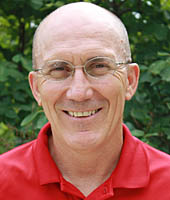AMES, Iowa -- In spite of a large field of Republican presidential candidates and even greater media interest in the Ames Straw Poll and related debate held at Iowa State University back in August, an ISU economist predicts that the economic impact from this year's "first-in-the-nation" Iowa caucuses will not be a substantial boon to the state. In fact, he expects it will fall well short of the spending from the 2008 caucuses, which saw both parties having open races for their respective presidential nominations.
Dave Swenson, an associate scientist in ISU's economics department, authored "The Economic Impact of the Iowa Caucus: Gauging the Worth of its First-in-the-Nation Position?" in 2008. The study found that the major presidential candidates' economic impact to the state was $15.5 million in total sales in the six months preceding the caucuses -- or about one-hundredth of 1 percent of the state's $130 billion gross domestic product value in 2007.
Swenson says while the exposure generated by the caucuses gives them the illusion of a significant economic impact to the state, "the real impact is nowhere near as much as people assume it is." And he expects that impact to be even less in this campaign cycle.
2008 was gold standard for caucus spending
"The last time [2008] we measured, it was a golden opportunity," said Swenson, who is on the staff of ISU's Regional Economics and Community Analysis Program. "It [nominations] was open on both sides and there was a lot of energy on both sides. And so we in Iowa probably got many more visits -- both early on and for the duration -- than we otherwise would have gotten.
"What we really care about in Iowa and what we tried to measure [in his 2008 study] was, withstanding the appearance of vibrancy, what are the facts? And the facts are how much money actually gets spent by buying something from an Iowa firm or paying a paycheck to an Iowa-based worker," he continued. "And of course the big finding was the economic impact was not much. And that was in a heck of a year for spending, so this one should see even less of an impact."
Swenson's previous report looked at 2007 third- and fourth-quarter financial transactions by all the major candidates who campaigned in Iowa prior to the Jan. 3 caucuses, as filed with the Federal Election Commission (FEC) reports (www.fec.gov). He found that major candidates spent $352.5 million across the country in the third and fourth quarters of 2007, but just $15.5 million (7.7 percent) in Iowa.
His study showed that the campaigns' election specialists are typically hired from Washington and other major cities, so organizational spending occurred in those states. The candidates' travel is also coordinated centrally through travel specialists, so much of it did not take place within the state.
"As we showed, the big money gets spent in D.C., Maryland and New York, and to buy all of the things that make a campaign possible, which is way more expensive than the actual campaigning in the state," he said. "The shoe leather campaigning in the state is cheap. All the other stuff is expensive."
As for what the candidates did spend money on in Iowa, most was for staff payroll ($5,485,080), travel ($2,229,973), printing ($1,993,712) and event fees ($1,123,309). Those were the four categories showing transactions of more than $1 million.
Swenson's economic impact estimate does not include spending by the large volume of national media who come to Iowa to cover the caucuses. He wrote in his report that there is no precise way to calculate this amount, particularly since he had no reliable estimate of the scope, frequency and duration of media visits.
Ames Straw Poll has minimal impact
Many members of the national and international media visited Iowa State along with thousands of GOP participants for the Ames Straw Poll on Aug. 13. But while the event drew even more media exposure -- particularly with the addition of the debate two days earlier -- Swenson doesn't see a significant economic impact from it.
"With the straw poll, a few thousand people descending on Ames is the equivalent of a pretty good high school basketball game," he said. "Truly that is not that big of a deal."
And contrary to popular opinion from some news outlets, neither is Iowa's economic windfall from the caucuses.
"It's not an economic boon," Swenson said. "What we get is a lot of attention and that's the value of it. It's the indirect value of it. The publicity is much more valuable than any of the candidates actually spend in the state. So you just consider it a large amount of free Iowa advertising and that's its value.
"I've been interviewed by members of the national media and they are incredibly disappointed when I tell them the truth [about the real economic impact to Iowa of the caucuses]," he added.
